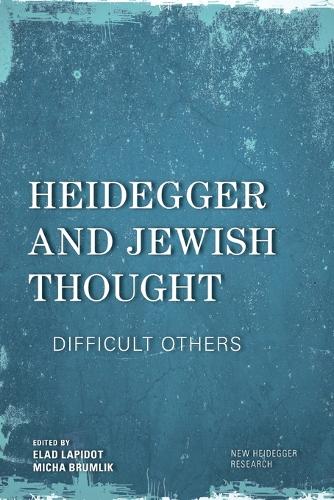
Heidegger and Jewish Thought: Difficult Others
(Paperback)
Available Formats
Publishing Details
Heidegger and Jewish Thought: Difficult Others
By (Author) Elad Lapidot
Edited by Micha Brumlik
Bloomsbury Publishing PLC
Rowman & Littlefield International
15th November 2017
United Kingdom
Classifications
Professional and Scholarly
Non Fiction
Philosophy of religion
Social groups: religious groups and communities
193
Physical Properties
Paperback
322
Width 153mm, Height 229mm, Spine 20mm
440g
Description
Once a prophet of critical, "other" thought, Heidegger has now for many become the epitome of the unthinkable, in the light of the Black Notebooks controversy. The unthinkable here is anti-Semitism. The encounter between Heidegger and the Jews has thus come to signify very much in the spirit of Heidegger's own anti-Judaism the end of thought. The present volume resists this view by positing not only Heidegger but also the Jewish people as representing thought. The encounter between Heidegger and various traditions of Jewish thought is conceived here as a conversation inter alia, an exchange between real or perceived "others": others to the philosophical tradition, to mainstream modernity, to Western Christian metaphysics, to each other, and even to themselves. The conversation takes shape in this volume as a symposium of seventeen essays by leading scholars both of Heidegger's philosophy and of Jewish Studies.
Reviews
. . . . this volume as a whole lives up to its own standard of being an intervention in the spirit of polemos. By assembling a wide array of approaches, it inter-venes in the most literal sense: It comes between dominant discursive positions that, while masquerading as neutral analyses of the ideological implications of Heideggers thinking, too often are deeply factional in character. Without attempting to mediate between or reconcile said positions, let alone Heidegger and the Jewish intellectual tradition, it attests to the possibility of productive dialogical dispute between modes of thought generally deemed incompatible. In doing so, it opens up the space for alternative ways of accessing the complex relation between these modes that go beyond collecting evidence for or against Heideggers anti-Semitism. * Journal of the Pacific Association for the Continental Tradition *
Difficult otherness is how Elad Lapidot names and frames the chasm, the aggrieved juxtaposition of these two names, markers of traditions, and figures of thought: Heidegger, the Jews. The expert scholars here assembled have collectively taken on the arduous and audacious task of looking into the abyss, this difficult alterity, reading and measuring it, exploring it, contesting or even bridging it. A remarkable and indispensable achievement. -- Gil Anidjar, Professor in the Departments of Religion, the Department of Middle Eastern, South Asian, and African Studies (MESAAS), and the Institute for Comparative Literature and Society (ICLS), Columbia University
a creative and useful addition to conversation on the relation between Heideggers legacy and Judaism. * ID: International Dialogue, A Multidisciplinary Journal of World Affairs *
Author Bio
Micha Brumlik is professor emeritus at the Goethe University of Frankfurt am Main and senior professor at the Center for Jewish Studies Berlin-Brandenburg. Elad Lapidot is a lecturer and researcher at the Freie Universitat Berlin and the Center for Jewish Studies Berlin-Brandenburg. He is the author of Etre sans mot dire (2010).
